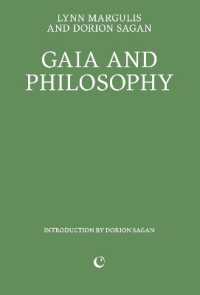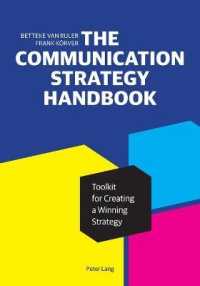- ホーム
- > 洋書
- > 英文書
- > Business / Economics
Full Description
In the wake of the global food crisis of 2008 Middle Eastern oil producers announced multi-billion investments to secure food supplies from abroad. Often called land grabs, such investments are at the heart of the global food security challenge and put the Middle East in the spotlight of simultaneous global crises in the fields of food, finance, and energy. Water scarcity here is most pronounced, import dependence growing, and the links between oil and food are manifold ranging from the economics of biofuels to climate change and the provision of crucial input factors like fuels and fertilizers. In the future, the Middle East will not only play a prominent role in global oil, but also in global food markets, this time on the consumption side.
In Oil for Food, Eckart Woertz analyzes the geopolitical implications behind the current investment drive of Arab Gulf countries in food insecure countries like Sudan or Pakistan. Having lived in Dubai for seven years, and drawing on extensive archival sources and interviews, he gives the inside story of how regional food security concerns have developed historically, how domestic agro-lobbies shape policy making, and how the failed attempt to develop Sudan as an Arab bread-basket in the 1970s carries important lessons for today's investments drive.
The book argues against the media hype that has been created around land grabs and analyzes why there has been such a gap between announced projects and their actual implementation. Instead, it calls for a revision of Gulf food security policies and suggests policy alternatives. It is essential reading for academics interested in the political economy of the Gulf region and for practitioners in governments, media, and international organizations who deal with contemporary food security and energy issues.
Contents
PART I: GULF FOOD SECURITY: HISTORY, POLITICAL ECONOMY, AND GEOPOLITICS; PART II: GULF FOOD SECURITY AND INTERNATIONAL AGRO-INVESTMENTS








